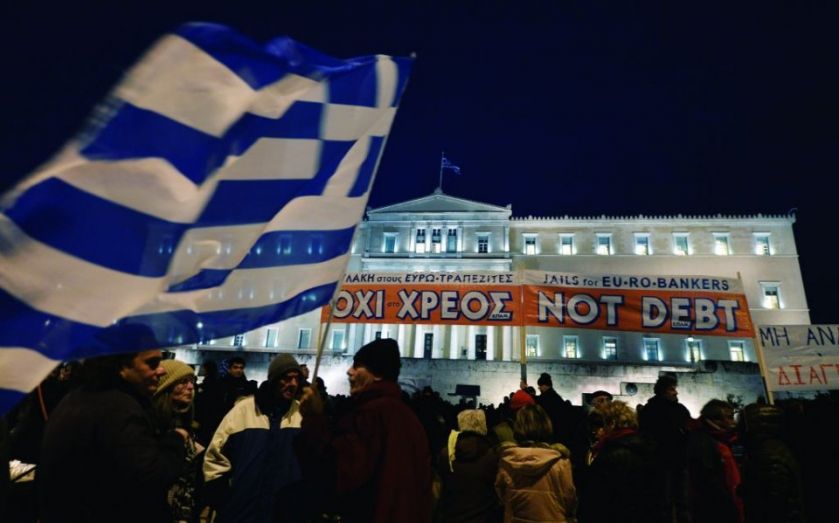Europe unlikely to pull plug on Greece’s banks

The European Central Bank (ECB) is unlikely to end emergency lending to Greek banks today despite a standoff between Europe and Athens.
Only last week, the ECB extended the cap on emergency funding (ELA) to Greece by €5bn (£3.7bn) to €65bn.
“There is no sudden end of ELA expected this week,” a person familiar with the situation told Reuters.
The governing council – the group who decides on ECB policy – reviews the amount of the emerging lending to Greece regularly.
Deposits have been flooding out of Greek banks since elections were called in early December. Despite a slowdown in deposit outflows in the week after Syriza’s victory, outflows have picked up again.
“Deposit outflows continue, and we estimate that since early December 2014 there have been more than €20bn so far from a private sector deposit base of €164.3bn as of end-November 2014,” Nondas Nicolaides, a senior credit officer at ratings agency Moody’s told City A.M.
Nicolaides believes it is likely ELA will be maintained by the ECB today, and might even be increased.
Greek banks are short of cash, so every time cash is withdrawn, the banks must match it with emergency borrowing. Nicolaides said pulling the ELA from under Greek banks would be completely unprecedented and thus unpredictable. ELA was once denied to a Cypriot bank – the Laiki bank – which soon collapsed. Yet this was only one bank and not an entire banking system.
As Greece rushes to strike a deal on its loan and bailout plan, who are the key characters who could decide the deal’s fate?
PIERRE MOSCOVICI
Pierre Moscovici is the European commissioner for economic and financial affairs. Before Monday’s meeting of the Eurogroup – a meeting of the Eurozone finance ministers – he gave Greek finance minister Yanis Varoufakis a draft of an agreement that complied with Greek demands, but it was later replaced.
JEROEN DIJSSELBLOEM
Jeroen Dijsselbloem is the Dutch finance minister and president of the Eurogroup. Dijsselbloem allegedly replaced an agreement Varoufakis would have signed with one that Greece could not agree to. Dijsselbloem said Greece would have to apply for an extension of its current programme, which it strongly opposes.
YANIS VAROUFAKIS
Yanis Varoufakis is the new finance minister of Greece. He is desperately trying to secure the future finances of Greece but is loath to agree to a bailout “extension” and instead wants a bridging loan – a short term loan to tide Greece over until a new long-term loan deal can be decided from scratch.
WOLFGANG SCHAUBLE
Wolfgang Schauble is Germany’s finance minister. He wants Greece to stick to its bailout and disagreed on almost everything he discussed in an earlier meeting with Varoufakis. He stoked tensions this week when he said Greece had “elected a government which at the moment is behaving rather irresponsibly”.
Q and A: A struggling Eurozone state, its debt, and its banking system
Q What will happen if Greece and its creditors are unable to reach an agreement?
A Since 2010, Greece has been on a bailout programme which has allowed its government to borrow €125.3bn (£93bn) at cheap interest rates, so long as it went through with reforms and austerity measures. More money will be available to Greece if it can show it is sticking to its programme, but Athens is strongly opposed to it. In fact, Syriza’s main election promise was to oppose it.
The government is scheduled to repay €1.2bn due on 6 March followed by a €1.5bn IMF loan repayment later in March. Further bond redemptions (debt repayments) of €3.5bn in July and €3.2bn in August. Reports suggest there is less than €2bn in Greece’s coffers. Without an agreement, Greece will likely default on its debt.
Q What is all the fuss about Greek banks?
A People have been pulling money out of Greek banks since the election was called in December. Greek banks are low on cash so if any depositor attempts to withdraw a deposit, the bank must borrow from Greece’s central bank. But this emergency lending is dependent on Greek banks being solvent – having assets worth more than their liabilities.
A good portion of Greek banks’ assets is Greek government bonds. If Greece defaults on its debt, its banks will see a significant proportion of their assets lose value and may be deemed insolvent. If insolvent, they will not be able to borrow further emergency lending. Banks would have to close their doors.
Q Could Greece leave the euro?
A Leaving the euro would be tempting for Greece if it was faced with a banking crisis. With its own central bank issuing its own currency, it could easily transfer funds to banks and also boost spending in the wider economy. A weaker currency would also make holidays to Greece cheaper, boosting its tourism industry.
Europe may not be too fazed by a Greek exit either. “European banks’ exposure to Greece has collapsed to virtually nothing. It was at $250bn (£163bn) in 2009. It dropped to $34bn currently. Today, over three quarters of Greek debt is owned by the Troika [IMF, EC and ECB],” said analysts at investors Lombard Odier. However, they note that if Greece left, the EU may then be faced with an increase in anti-austerity parties.